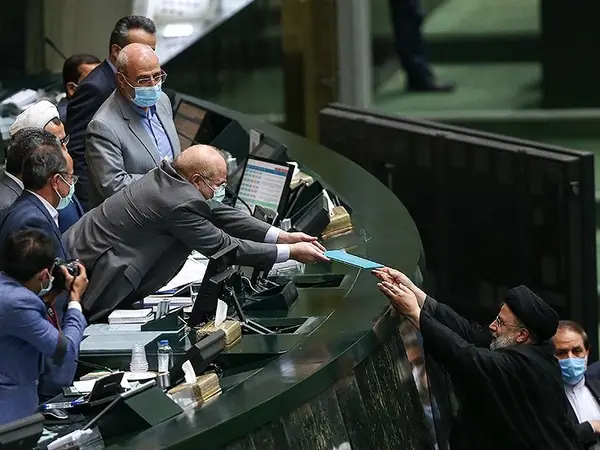Following an eventful row between Iran’s parliament and administration, the budget bill is finally getting the approval of lawmakers, but there is a catch about the country’s oil exports.
When the administration of President Ebrahim Raisi submitted the substantially enlarged draft state budget last week, it was apparent that the government has come up with plans to depend more on tax revenues instead of oil income. But now that the parliament has started reviewing the bill, it has become clearer that the administration plans to outsource most of its oil sales to military and religious organs.
In the budget bill for the next Iranian year, which starts March 21, the government has granted new permits to some departments such as the General Staff of the Armed Forces of the Islamic Republic and Astan Quds Razavi -- the Mashhad-based custodian and the administrative organization which managing a major religious shrine -- as well as a number pension funds to sell oil products on behalf of the government and earn some of the income.
According to the Note 1 of the bill – titled “Oil and its relations with the government” -- the National Iranian Oil Company is obligated to deliver “crude oil and gas condensates” to entities introduced by the executive bodies. As per the new measures, the General Staff of the Armed Forces is given the authority to sell and refine oil up to €4.5 billion. It means that the Armed forces can give crude oil to refineries and receive products that should be exported.
According to legal experts, this move, which also exists in a limited way in the current year’s budget, violates the constitution. This year, the government gave this permission to some individuals under the general title of "persons approved by executive bodies". The parliament had approved to give €3.5 billion of crude oil “to individuals” to sell on the world market and give the proceeds to the military. Last February, the Revolutionary Guard also received $80 million of oil from the government to sell as an additional budget appropriation. It also remains unclear who and under what conditions will export the oil amid US sanctions. Many members of Iran's hardliner dominated parliament are former members of the IRGC.
Sirous Omidvar, an Economics professor at the Allameh Tabatabai University, told Tejarat News that the legal details of such a mechanism are unclear and such economic handouts exclude ordinary business people. He predicts that such a mechanism is expected to lead to corruption.
A well-publicized scandal broke in 2013 when authorities arrested Babak Zanjani, a businessman, for embezzling at least $2.7 billion from illicit oil sales during international sanctions from 2009-2013. Zanjani used companies affiliated with the Revolutionary Guard (IRGC) for the oil he exported, leading to speculations that well-connected officials had a stake in the scheme. He received the death penalty which has so far not been carried out.
The draft budget is based on 1.4 million barrels of oil exports per day, despite US sanctions, an increase from the current reported figure of 800 thousand barrels. The discrepancy between reality and budget estimates gets even more interesting as the government expects to sell each barrel of oil for $85, while Iran is reportedly selling its oil to China at half that amount. The government estimate would mean more than $43 billion in oil revenues from March 2023 to March 2024. However, the official website of the government, IRNA, emphasized that the exact figure of crude exports is confidential and would not be announced due to the sanctions.
The projected oil exports in the budget are the clearest sign of unrealistic revenue estimates that will not materialize unless Iran resolves its differences with the United States over its nuclear program.
The government being aware that its oil revenue estimates are not realistic, it has substantially increased tax collection projections. In July, the Supreme Accounting Office released a report covering the period March 21- May 20 showing that except tax revenues, all other major sources of income grossly underperformed. The government’s revenues from taxes, oil exports, customs duties, etc. totaled 880 trillion rials or about $3.5 billion (average free market exchange rate at the time) in the 60-day period. This was just 37 percent of the projected budget revenues. It is important to note that only 15 percent of the projected oil income was collected.
